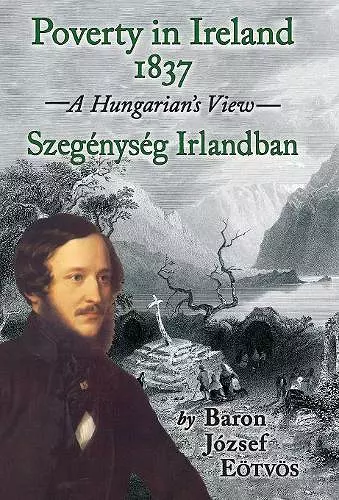Poverty in Ireland, 1837
A Hungarian's View : Szegenyseg Irlandban
Baron Jozsef Eotvos author Paul Sohar translator Laszlo Bakos translator Sheila Jones editor
Format:Hardback
Publisher:Phaeton Publishing Limited
Published:14th Apr '15
Should be back in stock very soon

In 1837, the power of Daniel O'Connell's oratory focused the attention of Europeans on Ireland. They were horrified at what they saw there. The Irish poor - a third of the population - had no food except the potatoes they grew, and not enough clothing to cover themselves. They went hungry for two months of the year, and half-naked for all the year. Yet this would be their last 'good' decade before more than a million of them would vanish into unmarked graves in the 1840s. The idealistic young Baron Eotvos - a humanitarian and already a much-praised poet - struggled to understand how Ireland could have been reduced to this state under English rule, and why English journalists wrote with such bigotry about the Irish. In Hungary, he was a campaigner for the freedom of serfs, but conceded that those serfs lived in better conditions and had more protection than Irish tenants and labourers. The only protection for the Irish poor came from illegal organizations such as the Whiteboys.His visit coincided with a pivotal moment in Irish history, when debate was raging about the introduction of a 'Poor Law' (with Poor Tax to pay for it) - a charitable-sounding term for a cruel Act aimed at clearing the land of people who had no other means of survival. His deeply researched summary of the English occupation of Ireland - uninfluenced by modern revisionism - makes compelling, often harrowing reading.
"ONE OF THE FIVE BEST IRISH-PUBLISHED BOOKS OF 2017 – The first thing the book does is demolish the fiction that Irish people were well-fed before the Famine. Ten years before it started they were already half starving in the streets… Young, aristocratic, educated, and unusually idealistic, Eotvos understood that some nations prospered through the brutal exploitation of others and he was unafraid to say how or why… Wherever he went he saw abundance in the midst of great poverty. The exploitation and cruelty were so extreme that it produced great sadness in the people and anger in Eotvos… Those who hold the power of life and death over others will use that power only for tyranny, Eotvos warned." – IRISH CENTRAL, NEW YORK; – "A remarkable study of the causes and effects of poverty in pre-Famine Ireland... an acutely accurate account of conditions in the country in the mid-1830s... The baron's sources are impeccable; he quotes widely and wisely, to add to his own observations... After 175 years the book rings true for the devastating accuracy of its reporting of the ills of Ireland and the reason why the poor suffered so much. Eotvos does not explicitly forecast the Great Famine but makes it clear that all the conditions for it had already been set in place by the 1830s. ...It's a vivid and gripping tale that totally contradicts the official story of Ireland peddled by its then administrators..." – BOOKS IRELAND MAGAZINE; – "On the Tragedy of the Irish, Through Hungarian eyes – There are few examples showing this troubled period of Ireland through the eyes of a foreigner (not Irish or British) with such scientific thoroughness and literary sensitivity. ...The book should be among the recommended readings for the responsible citizens of the European Union...this is an exemplary edition, being the first annotated version of Eotvos's work..." – CENTRAL EUROPEAN POLITICAL SCIENCE REVIEW; – "Amongst many visitors to pre-Famine Ireland was the Hungarian baron Jozsef Eotvos (a campaigner for the freedom of serfs who went on to become a major literary and political figure in his homeland); he was horrified by what he witnessed here and castigated Ireland's...rulers for exercising, as he put it, their 'unlimited and self-serving power over the people'..." – HISTORY IRELAND MAGAZINE; – "Highly interesting and an excellent publication both in content and format... an important contribution to an understanding of Eötvös in the international academic community." – Dr PAUL BODY [author of 'Joseph Eotvos and the Modernization of Hungary 1840-1870', American Philosophical Society, Philadelphia]; – "Very interesting and welcome text which presents the Hungarian original and the English translation on facing pages… Poverty in Ireland 1837 is a wonderful text that offers a reflective early-mid nineteenth-century observation on Ireland of less than a decade before the social and demographic cataclysm of the Great Famine. A fascinating insight…" – HUNGARIAN CULTURAL STUDIES, UNIVERSITY OF PITTSBURGH; – Also highly praised in Hungarian-language reviews in Austria and in Australia – in BECSI NAPLO (`VIENNESE DIARY’) Journal, Vienna; – and in MAGYAR ELET (`HUNGARIAN LIFE’) weekly, Melbourne & Sydney.
ISBN: 9781908420206
Dimensions: 216mm x 138mm x 19mm
Weight: 415g
222 pages